初三英语上册Unit11考点详解.doc
九年级英语全一册unit11知识点汇总
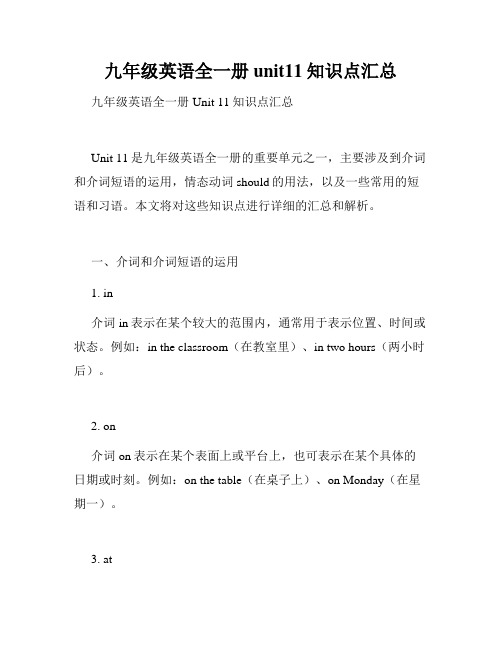
九年级英语全一册unit11知识点汇总九年级英语全一册Unit 11知识点汇总Unit 11是九年级英语全一册的重要单元之一,主要涉及到介词和介词短语的运用,情态动词should的用法,以及一些常用的短语和习语。
本文将对这些知识点进行详细的汇总和解析。
一、介词和介词短语的运用1. in介词in表示在某个较大的范围内,通常用于表示位置、时间或状态。
例如:in the classroom(在教室里)、in two hours(两小时后)。
2. on介词on表示在某个表面上或平台上,也可表示在某个具体的日期或时刻。
例如:on the table(在桌子上)、on Monday(在星期一)。
3. at介词at表示在某个地点或某个具体的时间点上。
例如:at the bus stop(在公交车站)、at 9 o'clock(在9点)。
4. by介词by表示通过某种方式或手段,也可表示在某个时间之前。
例如:by bus(乘坐公交车)、by tomorrow(到明天为止)。
介词和介词短语的运用在语言学习中非常重要,正确的使用可以增强句子的表达能力和准确性。
二、情态动词should的用法情态动词should表示建议、劝告、命令或期望,常用于祈使句或陈述句中。
例如:You should study harder.(你应该更加努力学习。
)should的否定形式为should not或shouldn't,表示禁止或不应该做某事。
例如:You shouldn't eat too much junk food.(你不应该吃太多垃圾食品。
)应用should不仅能够增强表达的明确性,还能够使语言更加礼貌和客观。
三、常用短语和习语1. make sure这个短语的意思是确保某事,常用于保证某件事情发生或不发生。
例如:Make sure to bring your passport when you travel abroad.(出国旅行时确保携带护照。
九年级英语unit 11 知识点
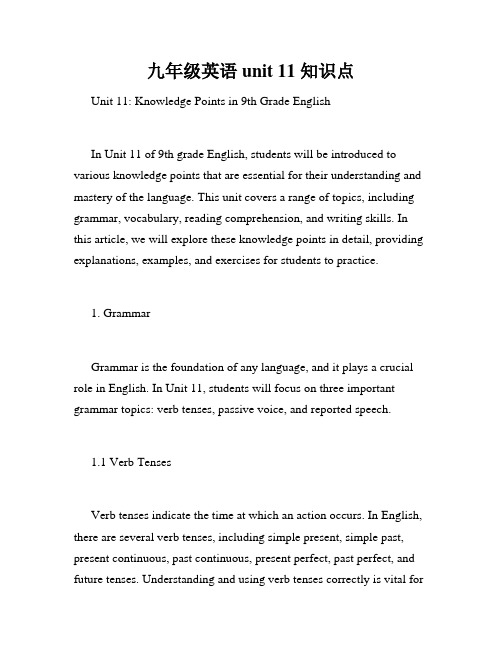
九年级英语unit 11 知识点Unit 11: Knowledge Points in 9th Grade EnglishIn Unit 11 of 9th grade English, students will be introduced to various knowledge points that are essential for their understanding and mastery of the language. This unit covers a range of topics, including grammar, vocabulary, reading comprehension, and writing skills. In this article, we will explore these knowledge points in detail, providing explanations, examples, and exercises for students to practice.1. GrammarGrammar is the foundation of any language, and it plays a crucial role in English. In Unit 11, students will focus on three important grammar topics: verb tenses, passive voice, and reported speech.1.1 Verb TensesVerb tenses indicate the time at which an action occurs. In English, there are several verb tenses, including simple present, simple past, present continuous, past continuous, present perfect, past perfect, and future tenses. Understanding and using verb tenses correctly is vital foreffective communication and comprehension. Let's look at some examples:- Simple Present: "She plays basketball every Saturday."- Simple Past: "I watched a movie last night."- Present Continuous: "They are studying for their exams."- Past Continuous: "We were playing soccer when it started raining."- Present Perfect: "He has visited three different countries."- Past Perfect: "She had already finished her homework before dinner."- Future Tense: "We will go on a trip next week."Throughout this unit, students will learn how to form and use different verb tenses in context through exercises and practice activities.1.2 Passive VoiceThe passive voice is used when the subject of a sentence is the receiver of an action rather than the doer. It is formed using a form of the verb "to be" plus the past participle of the main verb. Example:- Active Voice: "She wrote the novel."- Passive Voice: "The novel was written by her."Understanding when and how to use the passive voice is essential for clear and effective communication. Students will practice transforming active sentences into passive ones and vice versa.1.3 Reported SpeechReported speech is used to convey what someone said in the past. It involves a change in verb tense and pronouns. For example:- Direct Speech: "He said, 'I am going to the party.'"- Reported Speech: "He said he was going to the party."Students will learn the rules and practice transforming direct speech into reported speech.2. VocabularyUnit 11 introduces a variety of vocabulary related to different topics, such as sports, health, and education. Students will learn new words, their meanings, and how to use them in context. Vocabulary exercises and activities will help reinforce their understanding and application of these words.3. Reading ComprehensionReading comprehension plays a crucial role in language learning. In Unit 11, students will be exposed to various reading passages, such as newspaper articles, short stories, or biographies. They will practice reading for gist, scanning for specific information, and understanding implied meanings. Comprehension questions and activities will be provided to assess their understanding and encourage critical thinking.4. Writing SkillsWriting skills are necessary for effective communication. Unit 11 focuses on different types of writing, such as informal letters, persuasive essays, or descriptive paragraphs. Students will learn how to structure their writing, use appropriate language, and convey their ideas clearly. Writing prompts and guidelines will be given to guide their practice and improvement.ConclusionUnit 11 of 9th grade English covers essential knowledge points in grammar, vocabulary, reading comprehension, and writing skills. By mastering these topics, students can enhance their understanding, fluency, and proficiency in the English language. Regular practice, exercises, and activities will support their learning journey and ensure their success in communication and comprehension.。
九年级英语unit11全单元课文知识点详细讲解
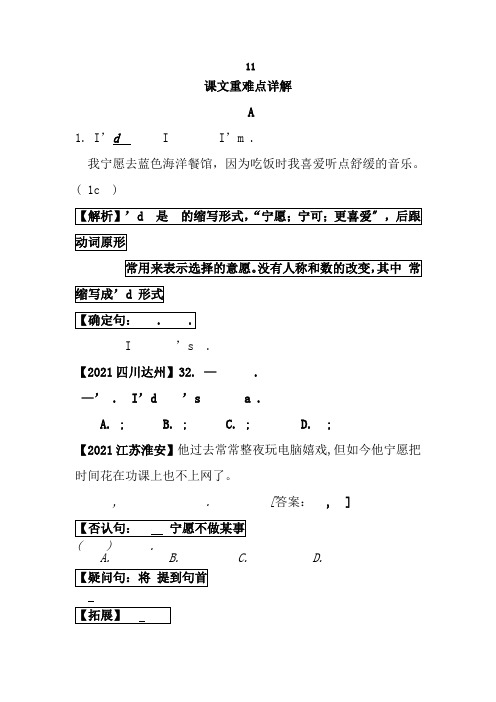
11课文重难点详解A1. I’d I I’m .我宁愿去蓝色海洋餐馆,因为吃饭时我喜爱听点舒缓的音乐。
( 1c )I ’s .【2021四川达州】32. — .—’ . I’d ’s a .A. ;B. ;C. ;D. ;【2021江苏淮安】他过去常常整夜玩电脑嬉戏,但如今他宁愿把时间花在功课上也不上网了。
, . [答案:, ]( ) .A. B. C. D.I () () a .【2021湖北襄阳3】— , .— I'd 's a .A. ,B. ,C. ,D. ,【2021湖北孝感2】— a !— . I a .A. ;B. ;C. ;D. ;2. . 但是那种音乐会让我昏昏欲睡。
( 1c ). 红色会使我惊慌。
, ’s .做鬼脸 查明,弄清 制作风筝 整理床铺 造句 a 制作噪音 犯错 赚钱 获得进步 … 及……交挚友 a 打 取笑 ’s 随意,不拘谨a 制作一份奶昔 a 谋生 组成,编造由……组 a 制定方案’s制定某人的方案 a 做确定 ’s 下定决心 ’s 整理床铺 沏茶 【拓展2】 构成的词组. ( ) , . .. .【2021鄂州】— I ’m 〔中考〕.— .A. ;B. ;C. ;D. ;【2021山东东营】28. .B. C. D.( ) , .A. B. C. D.【2021江苏盐城】68. () .【2021四川遂宁】— .— 2 .A. B. C.【2021贵州六盘水】37. .A. B. C. D.(3) “被让去做某事〞【2021四川内江】 .A. B. C. D. 【2021浙江杭州】.A.【2021山东烟台】30.— .—, I ’t . I .; ; ; ;【2021山东东营】28. .B. C. D.【2021苏州中考3】— o'—o’, ’s B. ,, I ’t D. , I’m【2021江苏盐城1】-- . , .A. B.C. ’tD.【2021福建厦门】’t .I .A. B. C.【2021江苏淮安】20. 吃太多的巧克力会令我们更简单发胖吗?( 答案: , )【2021山东菏泽】2.— a 10:30.A.3. . 等待艾美令缇娜有点抓狂。
九年级英语unit11全单元课文知识点详细讲解

2014 秋季九年级英语课文详解详练第 1 页共 17 页Unit 11 Sad movies make me cry课文重难点详解Section AHe ____________ play computer games all night, but now he ___________ spend his time onhis lessons than on the Internet. [答案: used to , would rather]【否定句: would rather not do sth 宁愿不做某事( ) He would rather __________ to jazz.I would rather _______ (watch) TV at home than _______ (go) out for a walk.2014 湖北襄阳 3】— Driving less, walking more is good for our health.— So I'd rather an hour's walk to work than consider a car.A. take, driveB. take, to driveC. take, drivingD. taking, drivingC. going out; stay at homeD. staying at home ; go out2. But that music makes me sleepy. 但是那种音乐会让我昏昏欲睡。
( 1c ) 【解析 1】主语+make sb. +adj. 意为“使某人感到⋯⋯ ; 使⋯⋯处于某种状态” The color red makes me nervous.【拓展1】: make ( made , made)的用法As for our next meeting, let's make it the day after tomorrow. make 构成的短语】maketea 泡 茶 make sentences 造 句 make friends with ⋯ make faces 做 鬼 脸 make a noise 制作噪音与⋯⋯ 交朋友 make sure 查明,弄清 makemistakes 犯 错 make a telephone 打电话 make kites 制作风 筝 make money 赚钱make fun of 取笑make the bed 整理床铺 make progress 取得进步 make one 's at home 【解析】 'd rather 是 would rather 的缩写形式,“宁愿;宁可;更喜欢” ,后跟动词原形 常用来表示选择的意愿。
Unit11九年级知识点
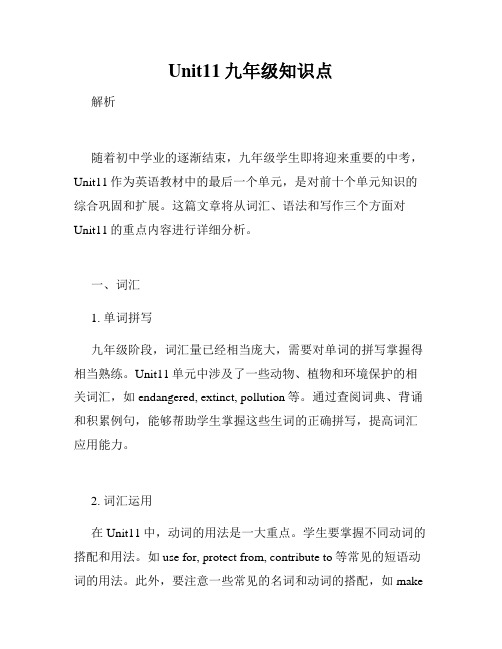
Unit11九年级知识点解析随着初中学业的逐渐结束,九年级学生即将迎来重要的中考,Unit11作为英语教材中的最后一个单元,是对前十个单元知识的综合巩固和扩展。
这篇文章将从词汇、语法和写作三个方面对Unit11的重点内容进行详细分析。
一、词汇1. 单词拼写九年级阶段,词汇量已经相当庞大,需要对单词的拼写掌握得相当熟练。
Unit11单元中涉及了一些动物、植物和环境保护的相关词汇,如endangered, extinct, pollution等。
通过查阅词典、背诵和积累例句,能够帮助学生掌握这些生词的正确拼写,提高词汇应用能力。
2. 词汇运用在Unit11中,动词的用法是一大重点。
学生要掌握不同动词的搭配和用法。
如use for, protect from, contribute to等常见的短语动词的用法。
此外,要注意一些常见的名词和动词的搭配,如makea difference, take action等,通过做词汇练习和句型转换,能够帮助学生熟练掌握这些词汇的用法。
二、语法在Unit11中,语法知识主要涉及虚拟语气和形容词和副词的比较级和最高级。
1. 虚拟语气虚拟语气是英语中的一个难点,也是九年级语法中的一大重点。
在Unit11中,出现了一些虚拟语气的用法,如表示建议、要求、命令、愿望和怀疑等。
学生要能够通过练习和阅读理解等方式,掌握虚拟语气的基本用法和句型结构。
2. 形容词和副词的比较级和最高级形容词和副词的比较级和最高级是英语语法中的基础知识点,也是九年级考试中的重点内容。
在Unit11中,涉及了一些比较级和最高级的用法,如形容词的比较级和最高级用于进行比较,副词的比较级和最高级用于描述程度。
学生要通过练习和背诵,熟练掌握这些用法,运用到写作和阅读理解中。
三、写作写作是英语学习中一个重要的方面,也是要求学生能够综合运用语法和词汇知识的能力。
在Unit11中,写作要求学生能够描述自己的环保行动,并给出一些建议。
人教版九年级上册第十一单元语法知识点梳理

人教版九年级上册第十一单元语法知识点梳理Unit 11:Sad movies make me cry.第十一单元的语法重点是:使役动词make的用法;在复合句中作主句的宾语。
使役动词make:make作使役动词时,意为“使、让”。
具体用法如下:★make+sb/sth+形容词,意为“使某人或某物……”,其中形容词作宾语补足语。
例如:Soft music makes me sleepy.轻柔的音乐让我想睡觉。
What he said made the teacher very angry.他说的话让老师很生气。
★make+sb/sth+动词原形,意为“使某人或某物……”,此处的动词原形是省略to的动词不定式,也作宾语补足语。
例如:That man made me think of my dear grandfather.那位老人让我想起了我亲爱的爷爷。
Bad environment makes people want to leave the city.糟糕的环境让人们想离开城市。
★使役动词make后跟省略to的动词不定式,变为被动语态时,须加上to。
例如:The teacher made me repeat the story.→I was made to repeat the story by the teacher.宾语从句:由连接词+主语+谓语构成,常由下面的一些连接词引导:★由that引导表示陈述意义that可省略。
如:He says(that)he is at home.他说他在家里。
★由if,whether引导表示一般疑问意义(带有是否、己否、对否等)。
如:I don't know if/whether Wei Hua likes fish.我不知道韦华是否喜欢鱼。
★由连接代词、连接副词(疑问词)引导表示特殊疑问意义。
如:Do you know what he wants to buy?你知道他想要买什么吗?★从句时态要与主句一致,当主句是一般现在时,从句根据情况使用任何时态。
九年级英语unit11知识点梳理
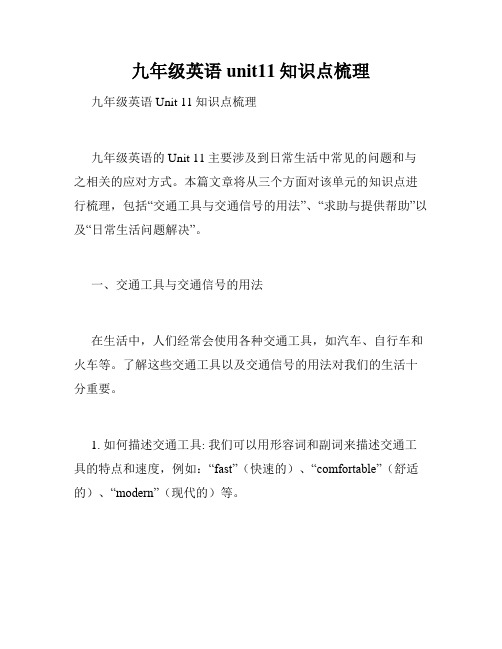
九年级英语unit11知识点梳理九年级英语Unit 11知识点梳理九年级英语的Unit 11主要涉及到日常生活中常见的问题和与之相关的应对方式。
本篇文章将从三个方面对该单元的知识点进行梳理,包括“交通工具与交通信号的用法”、“求助与提供帮助”以及“日常生活问题解决”。
一、交通工具与交通信号的用法在生活中,人们经常会使用各种交通工具,如汽车、自行车和火车等。
了解这些交通工具以及交通信号的用法对我们的生活十分重要。
1. 如何描述交通工具: 我们可以用形容词和副词来描述交通工具的特点和速度,例如:“fast”(快速的)、“comfortable”(舒适的)、“modern”(现代的)等。
2. 交通信号的用法: 交通信号是保障交通安全的重要手段。
我们需要了解交通信号的颜色及其对应的含义,例如红灯代表停,绿灯代表行,黄灯代表准备停车等。
3. 交通工具的使用场景: 不同的交通工具适合不同的场合。
我们需要了解何时应该坐公共汽车、什么时候应该骑自行车以及什么时候应该选择步行。
二、求助与提供帮助在生活中,我们难免会遇到各种问题,有时我们需要向他人求助,有时则需要提供帮助。
因此,学习如何准确地表达求助和提供帮助的需求是非常重要的。
1. 求助的方式: 当我们遇到问题时,可以采用不同的方式向他人寻求帮助,如“Could you please help me?”(你能帮助我吗?)、“Excuse me, can you give me a hand?”(打扰一下,你能帮我一下吗?)等。
2. 提供帮助的方式: 当我们看到他人需要帮助时,可以主动地提供援助,如“Can I help you?”(我能帮你吗?)、“Let me give you a hand!”(让我帮你一下!)等。
3. 礼貌用语的使用: 在求助和提供帮助的过程中,我们要注意礼貌用语的使用,如“thank you”(谢谢你)和“you're welcome”(不客气)等,这样可以提升交流的效果。
外研社英语九年级上册Module11教材全解知识点

外研社英语九年级上册Module11教材全解知识点Module 11Ⅰ.词汇A) 根据句意及首字母提示写出单词1. He is a famous a in a band.2. She won a silver m in the long jump.3. I can't find my glasses. Can you h me look for them?4. The film was so funny that I c stop l all the way through.5. It's r a quarter to nine. We have to hurry.B) 用方框内所给单词的适当形式填空1. He always wears a p T-shirt on weekends.2. There are many d clothes in the supermarket.3. Linda and her parents often go to the c on weekends.4. On Christmas Day, people exchange g and sing songs happily.5. Jake is a f football player. He plays very well.Ⅱ.短语A) 根据句意及中文提示用合适的短语填空1. I s the disc to my friend yesterday. (寄出)2. My father m the kite for me last weekend. (装配)3. She u for the school exam the whole night.(复习)4. Would you like to t me h your new bike?(给…展示)5. The teacher will e us the lesson tomorrow.(解释)B) 根据句意及括号内的汉语提示翻译下列句子1. 我的父亲昨天买了一辆新自行车给我。
九年级英语第十一单元重要考点归纳(整理打印版)
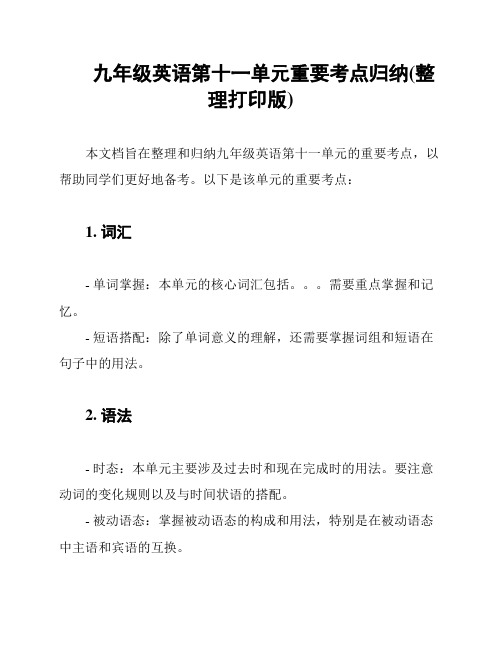
九年级英语第十一单元重要考点归纳(整
理打印版)
本文档旨在整理和归纳九年级英语第十一单元的重要考点,以帮助同学们更好地备考。
以下是该单元的重要考点:
1. 词汇
- 单词掌握:本单元的核心词汇包括。
需要重点掌握和记忆。
- 短语搭配:除了单词意义的理解,还需要掌握词组和短语在句子中的用法。
2. 语法
- 时态:本单元主要涉及过去时和现在完成时的用法。
要注意动词的变化规则以及与时间状语的搭配。
- 被动语态:掌握被动语态的构成和用法,特别是在被动语态中主语和宾语的互换。
3. 阅读理解
- 理解文章大意:通过快速阅读确定文章的主题和大意,了解每段的主要信息。
- 找出关键细节:识别文章中的关键信息,如时间、地点、人物等,以便更好地回答问题。
- 推测词义:通过上下文推测生词或不熟悉的词语的意思。
4. 写作
- 作文结构:了解作文的基本结构,包括开头、写作目的、主体段落以及结尾部分。
- 表达观点:在写作中要清晰地表达自己的观点,并给出充分的理由和支持。
- 使用连接词:使用连接词和过渡词组来组织文章并展示逻辑关系。
5. 口语
- 情景对话:熟悉日常对话中常用的表达方式和句型结构。
- 面试技巧:研究如何回答面试问题,在回答时要表达清晰、有条理,给出具体的例子。
以上就是九年级英语第十一单元的重要考点归纳。
同学们在备考过程中要注重词汇和语法的研究,提高阅读理解和写作能力,并积极参与口语练。
祝大家取得好成绩!。
Unit 11 基础知识讲解 人教版英语九年级全册

九年级Unit 11: Sad movies make me cry.一、“make + 宾语+宾补”的用法make 表示“使,让”时,为使役动词;常构成make + 宾语+ 宾语补足语的结构;其中,宾语补足语可由多种词性构成;1、make + 宾语+不定式(考查重点)主动语态:make sb. do sth. “让某人做...”省略不定式to;被动语态:be made to do sth. “...被迫做...”还原不定式to;My teacher made me finish the homework in an hour. 老师让我在一小时内完成作业。
I was made to finish the homework in an hour. 我被迫在一小时内完成作业。
2、make + 宾语+形容词(考查重点)Tom is funny and he always makes us happy. 汤姆很有趣,他总是让我们高兴。
The internet makes our life more convenient. 互联网使我们的生活更方便。
3、make + 宾语+名词We all agreed to make Sam our leader. 我们都同意让Sam 当我们的领袖。
4、make + 宾语+过去分词当过去分词做宾语补足语时,过去分词与宾语之间存在被动关系;“让...被...”;通常此时的宾语为反身代词Mr. Black speaks loud to make himself heard in the class.布莱克先生大声说话,使自己在课堂上听得见。
(让自己被听见)5、make + it + adj. + to do sth. (考查重点)此句型中it 为形式宾语,真正的宾语为to do sth;In order to make it easier to remember the words, Jenny decides to make some word cards.为了记忆单词更容易,珍妮决定制作一些词卡。
(完整word版)人教版九年级英语全一册Unit11知识点总结

人教版九年级英语全一册Unit11知识点总结九年级英语unit11知识点总结九年级1.SO+be动词/助动词/情态动词+主语表达前面所陈述的情况也适合另外一人,意为“某某也一样”知识点来源:A.Iˈm hungry,Amy.我饿了,艾米.B.So am I.Why don’t we get something to eat.我也饿了,我们为什么不弄点吃的东西呢?助动词举例:do,did,does,have,has...be 动词举例: am,is ,are ,was ,were...情态动词举例: can,could,may,should,must,...例句:①He goes to school every day. So do I.他每天上学,我也如此。
②He is fourteen. So am I.他十四岁,我也十四。
③He can speak English. So can I. 我也会。
对别人情况加以肯定时常用so+主语+助动词如:①The students work hard. So they do. 他们学习努力,他们确实努力。
②He is good at maths. So he is.(他善长数学,他确实善长数学。
)练习①I went to the movies yesterday.______________(Dale也去了。
)②Dale’s brother is a student. _________________(我也是。
)③I have finished my homework. _________________(Dale也完成了。
)④Dale should see a doctor.______________________(Mike也应该去。
)2.why don’t you do sth =why not do sth你为什么不做某事呢?知识点来源;Why don’t we get something to eat.翻译句子:你为什么不早起呢?_____________________________________________________.我们为什么不去看电影呢?_____________________________________________.3.make的用法①make sb do sth 使某人做某事知识点来源:The soft music makes me relax.柔和的音乐让我放松。
九年级英语unit11知识点讲解

九年级英语unit11知识点讲解Unit 11 Knowledge Points in 9th Grade EnglishUnit 11 in 9th grade English covers various knowledge points related to language learning. In this article, we will explore some of the key topics in this unit, focusing on vocabulary, grammar, and reading comprehension.Vocabulary plays a crucial role in language acquisition, and this unit introduces students to new words and phrases. One of the prominent themes is education. Students will encounter terms such as "scholarship," "homework," and "assignment." Understanding these words enables students to better comprehend educational materials and engage in classroom discussions actively.In addition to education-related vocabulary, this unit also includes words related to feelings and emotions. Students will learn expressions like "nervous," "excited," and "relieved." Recognizing and using such words allows individuals to accurately articulate their emotions and communicate effectively with others.Grammar is another significant aspect of language acquisition covered in Unit 11. Verb tenses, specifically the past continuous and the past perfect, are the primary focus. These tenses are essential for describing and narrating past events in a precise manner.The past continuous tense is used to describe an ongoing action or event in the past. For example, "I was studying when she called me." This tense emphasizes the duration of the action in relation to other events.The past perfect tense, on the other hand, is used to indicate that an action occurred before another action in the past. For instance, "He had finished his homework before he went to the party." The past perfect tense helps in establishing the chronological order of events.While mastering grammar is crucial, reading comprehension is equally important for overall language proficiency. Unit 11 introduces various reading passages to enhance students' reading skills. These texts cover a wide range of topics, from biographies to newspaper articles.One particular passage delves into the life of Malala Yousafzai, the Nobel Peace Prize laureate from Pakistan. Through this reading,students can learn about her dedication to girls' education and her courageous fight against the suppression of education for women. This inspiring story not only broadens students' knowledge but also encourages them to pursue their dreams ardently.Another passage explores the impact of technology on education. Students will explore the advantages and disadvantages of using technology in the classroom. This topic allows students to critically analyze the influence of technology on learning and to develop their own opinions.To further enhance reading comprehension, the unit also introduces various comprehension exercises. These exercises test students' understanding of the texts and their ability to extract key information. By completing these exercises, students can sharpen their analytical skills and improve their overall reading proficiency.In conclusion, Unit 11 in 9th grade English covers a wide range of knowledge points to enhance students' language learning experience. From vocabulary expansion to mastering verb tenses and improving reading comprehension, this unit offers a comprehensive approach to language acquisition. By continuously practicing and applying theseknowledge points, students can strengthen their English skills and become more confident in expressing themselves.。
九年级英语全册unit11知识点

九年级英语全册unit11知识点九年级英语全册Unit 11知识点Unit 11 is an important unit in the ninth-grade English textbook. It covers a wide range of topics and introduces various grammatical structures and vocabulary. In this article, we will explore some of the key points in Unit 11.1. Vocabulary Expansion:Unit 11 introduces new vocabulary related to travel and transportation. Students will learn words such as "destination," "journey," "traffic jam," and "arrive," among others. This vocabulary will enable students to better express themselves when discussing travel experiences or planning trips.2. Verb Patterns:Unit 11 emphasizes verb patterns, including infinitives, gerunds, and base verbs. Students will practice using these patterns in different contexts, such as "I plan to visit Beijing," "I enjoy swimming," and "I like playing basketball." Understanding verb patterns is crucial for constructing grammatically correct sentences and expressing ideas accurately.3. Modal Verbs:Modal verbs play a significant role in Unit 11. Students will learn how to use modal verbs such as "can," "could," "may," and "might" to express abilities, possibilities, and permission. For example, students will practice using sentences like "I can swim," "I could finish the project," and "May I go to the restroom?" Mastering modal verbs is essential for effective communication in English.4. Conditional Sentences:Unit 11 introduces different types of conditional sentences, including zero, first, and second conditional. Students will learn how to form these sentences and use them to express hypothetical situations and their possible outcomes. For example, students will practice constructing sentences like "If it rains, we will stay indoors" or "If I had time, I would visit my grandparents."5. Reading Comprehension:Unit 11 includes various reading passages that allow students to enhance their reading comprehension skills. The passages cover topics related to travel and exploration, providing opportunities for students to improve their understanding of the English language while learning new vocabulary and grammatical structures.6. Writing Practice:Students in Unit 11 will engage in writing exercises that focus on descriptive writing, narrative writing, and expressing opinions. These activities will help students develop their writing skills and enable them to convey their thoughts and ideas effectively in written form.7. Listening Practice:Unit 11 offers a range of listening activities that allow students to improve their listening comprehension skills. Students will listen to dialogues, conversations, and monologues related to travel experiences, transportation, and cultural exploration. These activities enhance students' ability to understand spoken English and familiarize them with different accents and speech patterns.In conclusion, Unit 11 of the ninth-grade English textbook covers a diverse range of topics and essential language skills. From vocabulary expansion and verb patterns to modal verbs, conditional sentences, reading comprehension, writing practice, and listening exercises, this unit provides students with extensive opportunities to enhance their English language proficiency. By actively engaging in the lessons and completing the exercises, students will develop a solid foundation inEnglish that will serve them well in their future language learning endeavors.。
Unit 11 中考九年级英语知识点
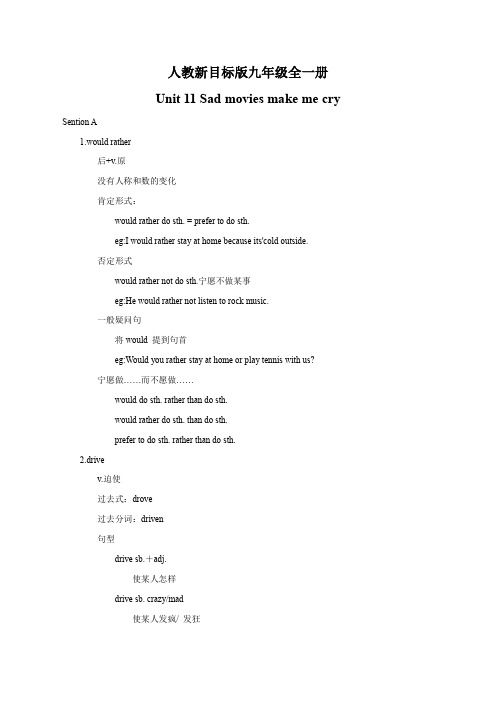
人教新目标版九年级全一册Unit 11 Sad movies make me cry Sention A1.would rather后+v.原没有人称和数的变化肯定形式:would rather do sth. = prefer to do sth.eg:I would rather stay at home because its'cold outside.否定形式would rather not do sth.宁愿不做某事eg:He would rather not listen to rock music.一般疑问句将would 提到句首eg:Would you rather stay at home or play tennis with us?宁愿做……而不愿做……would do sth. rather than do sth.would rather do sth. than do sth.prefer to do sth. rather than do sth.2.drivev.迫使过去式:drove过去分词:driven句型drive sb.+adj.使某人怎样drive sb. crazy/mad使某人发疯/ 发狂eg:The loud music drove me crazy.3.have...in common有……共同点常用短语have a lot in common有许多共同点have nothing in common没有共同点tely最近,不久前用于完成时=recentlyeg: I haven't been sleeping well just lately.辨析latestadj.最近的,最新的lateradv./adj.随后,后来的lateadv./adj.迟(的)latelyadv.=recently近来5.friendsbe friends with sb.成为某人的朋友eg:It was my luck to be friends with him.make friends with sb.与某人交朋友eg:I want to make friends with you.6.leave out不包括;不提及;忽略feel left out觉得被遗忘了eg:Don't worry. I didn't feel left out.7.for no reason没有理由eg: Peter is often late for work for no reason.辨析reason指原因cause指影响8.call in召来;叫来动副短语call sb. inI called the police in召来某人,叫来某人call sth. in下令收回某物,要求退回某物call相关的短语call back 回电话call up 打电话;回想起call off 取消call on 拜访,号召call out 叫喊call for 要求;需要;去接9.examinevt. (仔细地)检查;检验+n./pron.作宾语eg: The doctor examined the child and said she was healthy.+whether 从句作宾语eg: They were examining whether this matter was good or bad.可用于被动语态=look over辨析review侧重再检查、复审examine侧重看人或事物存在的毛病,故障check前后数量等是否一致,也用于判断事物的正误test侧重看质量、水平等是否过关10.neither...nor既不……也不……就近原则eg:Neither he nor I am well educated11.in three days' time在三天的时间里“in+一段时间”常用于将来时态eg: It is about 20 minutes' bus ride from my home to school12.makemake+ 宾语+ adj.使……处于某种状态eg: The Internet makes our life easy and convenient.make +宾语+n.使/让某人成为……;使……当……eg: Many people make singing their careermake+ n./ pron.+ 不带to的动词不定式迫使、强制某人做某事eg: Nobody made us go to bed at a certain timemake +宾语+过去分词使某人/ 某物被……eg: The teacher raised his voice so that he could make himself heard13.to start with起初;开始时=to begin with/at first/in the beginningeg: To start with/ begin with,we had very little interest in English study Sention B1.even though尽管;虽然;即使eg: He went out even though it was raining.辨析even though引导的从句内容是真实的尽管,虽然eg:Even though it's hard work, I enjoy it.even if引导的从句是假设性的即使,就算,哪怕eg:They'll stand by you even if you don't succeed.2.weightn.重量常用短语put on weight 体重增加;长胖lose weight 减肥3.let...down使……失望动词+副词宾语是人称代词时,放在两词间let短语let out 下课;散会let alone 不打扰let in 允许进入let through 允许……通过4.kick sb. off开除某人eg: The boss kicked him off last week.kick短语kick on 开始工作kick down 踢倒kick against反抗kick back 踢回,反击5.be(too) hard on sb.对某人(太)苛刻,对某人严格=be strict with sb.eg: You shouldn't be hard on yourself.6.rather than而不是……用在两个平行结构中单纯地表示否定eg: She cried rather than smiled.表示主观上的选择eg: I decided to write rather than telephone.7.continue to pull together继续齐心协力continue to do sth.继续做某事eg: You should continue to work hard.pull together齐心协力;通力合作eg: Everyone in our team should pull together to win the game.8.disappointv. 使失望disappoint sb.=let sb. downeg: I'm sorry to disappoint you, but I can't agree with you after all. Sention A1.would rather后+v.原没有人称和数的变化肯定形式:would rather do sth. = prefer to do sth.eg:I would rather stay at home because its'cold outside.否定形式would rather not do sth.宁愿不做某事eg:He would rather not listen to rock music.一般疑问句将would 提到句首eg:Would you rather stay at home or play tennis with us?宁愿做……而不愿做……would do sth. rather than do sth.would rather do sth. than do sth.prefer to do sth. rather than do sth.2.drivev.迫使过去式:drove过去分词:driven句型drive sb.+adj.使某人怎样drive sb. crazy/mad使某人发疯/ 发狂eg:The loud music drove me crazy.3.have...in common有……共同点常用短语have a lot in common有许多共同点have nothing in common没有共同点tely最近,不久前用于完成时=recentlyeg: I haven't been sleeping well just lately.辨析adj.最近的,最新的lateradv./adj.随后,后来的lateadv./adj.迟(的)latelyadv.=recently近来5.friendsbe friends with sb.成为某人的朋友eg:It was my luck to be friends with him.make friends with sb.与某人交朋友eg:I want to make friends with you.6.leave out不包括;不提及;忽略feel left out觉得被遗忘了eg:Don't worry. I didn't feel left out.7.for no reason没有理由eg: Peter is often late for work for no reason.辨析指原因cause指影响8.call in召来;叫来动副短语call sb. inI called the police in召来某人,叫来某人call sth. in下令收回某物,要求退回某物call相关的短语call back 回电话call up 打电话;回想起call off 取消call on 拜访,号召call out 叫喊call for 要求;需要;去接9.examinevt. (仔细地)检查;检验+n./pron.作宾语eg: The doctor examined the child and said she was healthy.+whether 从句作宾语eg: They were examining whether this matter was good or bad.可用于被动语态=look over辨析review侧重再检查、复审examine侧重看人或事物存在的毛病,故障check前后数量等是否一致,也用于判断事物的正误test侧重看质量、水平等是否过关10.neither...nor既不……也不……就近原则eg:Neither he nor I am well educated11.in three days' time在三天的时间里“in+一段时间”常用于将来时态eg: It is about 20 minutes' bus ride from my home to school12.makemake+ 宾语+ adj.使……处于某种状态eg: The Internet makes our life easy and convenient.make +宾语+n.使/让某人成为……;使……当……eg: Many people make singing their careermake+ n./ pron.+ 不带to的动词不定式迫使、强制某人做某事eg: Nobody made us go to bed at a certain timemake +宾语+过去分词使某人/ 某物被……eg: The teacher raised his voice so that he could make himself heard 13.to start with起初;开始时=to begin with/at first/in the beginningeg: To start with/ begin with,we had very little interest in English study Sention B1.even though尽管;虽然;即使eg: He went out even though it was raining.辨析even though引导的从句内容是真实的尽管,虽然eg:Even though it's hard work, I enjoy it.even if引导的从句是假设性的即使,就算,哪怕eg:They'll stand by you even if you don't succeed.2.weightn.重量常用短语put on weight 体重增加;长胖lose weight 减肥3.let...down使……失望动词+副词宾语是人称代词时,放在两词间let短语let out 下课;散会let alone 不打扰let in 允许进入let through 允许……通过4.kick sb. off开除某人eg: The boss kicked him off last week.kick短语kick on 开始工作kick down 踢倒kick against反抗kick back 踢回,反击5.be(too) hard on sb.对某人(太)苛刻,对某人严格=be strict with sb.eg: You shouldn't be hard on yourself.6.rather than而不是……用在两个平行结构中单纯地表示否定eg: She cried rather than smiled.表示主观上的选择eg: I decided to write rather than telephone.7.continue to pull together继续齐心协力continue to do sth.继续做某事eg: You should continue to work hard.pull together齐心协力;通力合作eg: Everyone in our team should pull together to win the game.8.disappointv. 使失望disappoint sb.=let sb. downeg: I'm sorry to disappoint you, but I can't agree with you after all.。
- 1、下载文档前请自行甄别文档内容的完整性,平台不提供额外的编辑、内容补充、找答案等附加服务。
- 2、"仅部分预览"的文档,不可在线预览部分如存在完整性等问题,可反馈申请退款(可完整预览的文档不适用该条件!)。
- 3、如文档侵犯您的权益,请联系客服反馈,我们会尽快为您处理(人工客服工作时间:9:00-18:30)。
2018年长沙初三英语上册Unit11考点详解
Unit11Sad movies make me cry.
【考点详解】
1. But that music makes me sleepy. 但是那种音乐使我困倦。
动词make 的使役用法,make sb 后分别接了形容词和不定式短语。
make 的这种用法常见于以下结构:
make+名词(代词)+省略to 的动词不定式
My parents often make me do some other homework. 我父母常让我做些其他的作业。
这一结构中的不定式短语在主动结构中是宾语补足语,必须省去to,变为被动结构时,不定式短语作主语补足语,这时必须带to。
如:She was made to work for the night shift. 她不得不上夜班。
②make+名词/代词+-ed 分词短语。
如:What made them so frightened? 什么使他们这样害怕?
③make+名词/代词+介词短语或名词短语。
如:She made him her assistant. 她委派他做自己的助手。
④make+名词(代词)+形容词或形容词短语。
如:—The good news made us happy. 这条好消息使我们很高兴。
—Yes,I suppose so. 我想他会回来。
⑤make +形式宾语it +形容词或名词(作宾语补足语)+从句(作真正的宾语)
如:They want to make it clear to the public that they do an
important and necessary job.
他们要向公众表明,他们所做的工作不但重要,而且是必不可少的。
2. wealth n. 财富
①表示“财富”“金钱”,是不可数名词。
如:
They had little desire for wealth. 他们对财富无大欲望。
②表示“大量”“众多”“丰富”等,可连用不定冠词,尤其用于 a wealth of 结构(其后可接可数名词或不可数名词)。
如:He sent me a book with a wealth of illustrations. 他送给我一本有大量插图的书。
Hidden underground is a wealth of gold, silver, copper, lead and zinc.
地下埋藏了大量的金、银、铜、铅和锌。
3. He slept badly and didn’t feel like eating.他睡眠很差并且不想吃东西。
feel like 的用法:
①表示“感觉像(是)……”
My legs feel like cotton wool. 我感觉两条腿像棉花一样。
②表示“想要做……”,后接动名词doing 形式。
I don’t feel like cooking. Let’s eat out. 我不想做饭,我们出去吃吧。
